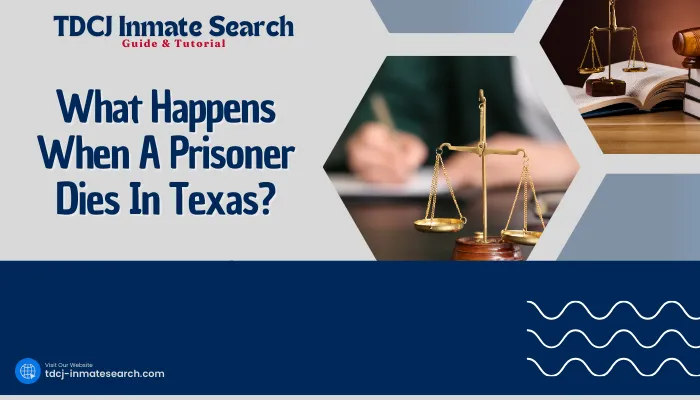What Happens When A Prisoner Dies In Texas? This question is an important one that requires careful consideration.
When a death occurs in the correctional facility, there are certain activities which must be done urgently by the authorities to find out whether there were any issues before it happened and also establish responsibilities.
The system, however complex it may look, is based on prompt notifications; thorough investigation; compliance with laws requiring reports to be made available; and provision of details on what transpired without infringing privacy and confidentiality rights for both the deceased and their family members.

Understanding the Process
What Happens When A Prisoner Dies In Texas? This process ensures that a systematic approach is followed while investigating deaths in Texas Prisons involving key stages and actors.
Initial Response
The process following a prisoner’s death involves crucial steps by the Texas Department of Criminal Justice (TDCJ) to ensure proper handling and notification.
- Immediate Notification: When a prisoner dies anywhere within any Texas Department of Criminal Justice (TDCJ) facility, they shall immediately notify them about this tragedy. This is very significant because it marks the commencement of examining protocols on how that particular death took place.
- Medical Verification: The medical staff at TDCJ must validate if indeed life has expired from such an individual. This helps ascertain if indeed there was cessation of breathing amongst other vital functions.
- Notification of Next of Kin: The next thing concerns informing relatives about who died respectively requiring high levels of sensitivity. Therefore, TDCJ has got this obligation executed via contacting these relations directly indicating what happened leading to demise.
All such strategies underscore protection for families as well as proper probe soon after anyone perishes behind bars across different penitentiaries globally.
Investigation and Autopsy
Inquiry into inmates’ deaths seeks to establish the cause and manner of death, sometimes using autopsy and outside agency for impartiality.
- Cause of Death Determination: The most important aspect is determining what led to the person’s passing. Normally, this calls for an inclusive medical examination which may entail postmortem analysis.
- Manner of Death: Other than the reasons behind such demise; investigators are also concerned with how this happened. It might be natural or unnatural as well as accidental, homicidal, suicidal or undetermined.
- Investigation by Outside Agency: Often times, death investigations at prisons involve consultants from outside law enforcement agencies who aid in the process. This helps in giving a sense of fairness while instilling confidence into general public about what is being done towards that end.
All these steps help establish truth; foster extensive inquiry and create trust among people with respect to issues relating to dying while serving punishments in custody.
Notification of Authorities
The Office of Attorney General and coroner must be informed after a prisoner has died so that they can facilitate proper investigations and reporting processes.
- Informing the Coroner: When someone dies in jail, his/her death is reported to coroners whose responsibility involves examining such occurrence to ascertain cause and manner of dying.
- Reporting to the Attorney General: On its part, TDCJ shall report this information concerning dead inmates to OAG. These are usually made public even though specific details on how they died may not be included here.
While lacking details, these notifications are necessary for legal and public transparency to ensure that such deaths are officially documented and mentioned in relevant reports.
Disposition of Remains
- Next of Kin Arrangements: If the family of the deceased wishes to take charge or claim the body, appropriate arrangements will be made.
- Unclaimed Bodies: The state may intervene by burying or cremating such bodies if they remain unclaimed.
The way how a prisoner’s death is handled in Texas involves comprehensive processes ranging from initial response to disposition aimed at ensuring legality, transparency as well as respect for the dead.
Factors Affecting the Process
There are several factors that can affect what happens when a prisoner dies in Texas:
Cause of Death: How someone died determines a lot about their death investigation and further actions afterwards.
Inmate's Medical History: Pre-existing conditions can determine the cause of death.
Prison Conditions: Overcrowding, lack of proper medical care as well as violence leads to inmate deaths among others.
State Laws and Policies: State laws and TDCJ policies outline specific procedures followed during an inmate’s death.
Challenges and Criticisms
However, criticisms have been levied against it owing to some concerns. It has however suffered from challenges which include:
- Transparency: Public oversight and accountability regarding inmate deaths is suppressed as critics argue that insufficient information is provided about them in public reports.
- Medical Care: Quality of healthcare given to inmates should not be taken lightly because many preventable deaths occur due to this reason.
- Prison Conditions: Conditions like overcrowding create a conducive environment for inmates’ murders within Texas prisons while other cruel experiences play part.
What Happens When A Prisoner Dies In Texas? therefore becomes a question needing continuous attention and scrutiny.
This will help us understand the process and challenges involved so that we work together to better treat the inmates as well as ensure thorough investigations about their deaths are done in transparency.
Additional Considerations
Beyond procedural protocols, it’s crucial to address inmate rights, family grieving, and systemic issues like overcrowding and medical care to enhance the correctional system’s humanity and effectiveness:
| Inmate Rights: Even after death, an inmate has rights such as a prompt and fair inquiry. Family Grieving: The death of someone’s beloved is hard on them, and families of dead prisoners ought to be helped. Prevention: Solving overcrowding, inhumane medical support services, and violence can prevent prison deaths. |
Ultimately, what should be aimed at is a correctional system for which there is almost no loss of life. Knowing what happens when a prisoner dies in Texas will help us achieve this.
What Happens When A Prisoner Dies In Texas? is a question that will remain until reforming the system to prioritize lives behind bars.
Conclusion
To sum up it all, What Happens When A Prisoner Dies In Texas? is a question that forces people in the state to critically think about its’ correction systems.
This is because it is supposed to be a system where inmates are treated humanely and every instance of death handled with proper investigation towards preventing reoccurrence of such incidents in future.
Coming up with solutions for overcrowding, lack or inadequate medical facilities and non-transparency would go along way into improving the lives of incarcerated people in Texas thus reducing cases of inmate deaths.
